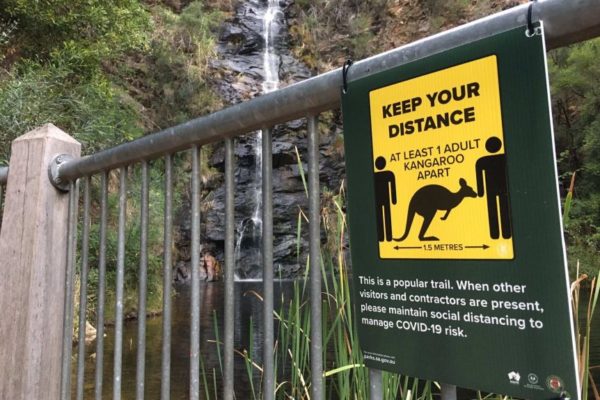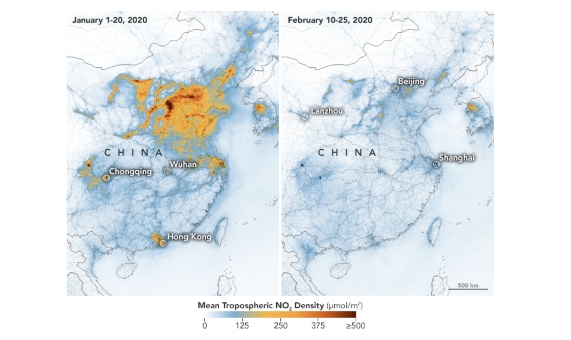
From reduced air pollution to cleaner water, the COVID-19 pandemic has provided a vision of hope: evidence that we are capable of rapidly changing our behaviours to build a cleaner, healthier environment. However, what is less clear is whether this vision can be translated into reality. To help investigate this question, the Network of Social Scientists convened an online workshop in late May. The group of around 30 academics and environmental professionals pooled their expertise to explore the effects of the pandemic on the environment. Through investigating the following three questions they identified a range of impacts and barriers to change, as well as techniques for sustaining positive outcomes as the lock downs ease.
What have been the environmental impacts of the COVID-19 pandemic?
A diverse range of positive and negative environmental effects were highlighted by NESS experts. Many enforced changes from the lock downs led to environmental benefits: more cycling, gardening and engagement in green spaces, a reduction in food waste and greater support for local businesses and food chains were all suggested. In the workplace, a remarkable transition to an online world challenged the dominance of in-person meetings and international travel, both reducing environmental impacts and increasing accessibility and connectivity.
 Attitudes may have also changed. Trust in experts was enhanced by the centrality of health experts on daily news reports and other media. Some workshop participants believed more positive attitudes towards our ability to create change had emerged, which could flow onto increased mobilization against climate change. Our ability to collectively shoulder immense economic risks to safeguard our health proved that politics can produce results in times of crisis. Some argued that this has shown that the ‘behaviour change barrier’ can be broken.
Attitudes may have also changed. Trust in experts was enhanced by the centrality of health experts on daily news reports and other media. Some workshop participants believed more positive attitudes towards our ability to create change had emerged, which could flow onto increased mobilization against climate change. Our ability to collectively shoulder immense economic risks to safeguard our health proved that politics can produce results in times of crisis. Some argued that this has shown that the ‘behaviour change barrier’ can be broken.
However, as many social scientists noted, behavioral changes are likely to slide as we slowly return to past habits. As well as this concern, NESS experts highlighted the range of negative environmental impacts which were resulting from the pandemic. The drowning out of attention on bushfires and climate change, the continued practice of ‘ghost flights’, a surge in internet and energy use, and the quadrupling of medical waste indicated a high level of doubt about whether any longer term positive environmental benefits will be sustained.
What barriers may prevent our ability to sustain positive environmental effects?
The UN Secretary General António Guterres hoped that 2020 would be a pivotal year for addressing climate change. Yet despite the horror of the 2019/20 Australian bushfires, media and political attention swiftly re-focused on the pandemic. As the economic and social costs of the pandemic built, NESS experts noted how political barriers resisting change may once again reassert themselves. The renewed focus on development and jobs might serve as a reason or excuse to cut environmental funding, projects and regulations aiming to protect the environment as has happened in previous economic downturns. The prioritization of a gas led recovery indicates limited political support for a fast transition to clean energy. While calls for an Australian ‘green new deal’ are growing, countering the desire to strip back environmental regulation will require a sustained and powerful collective response.
 As work and holidays returns to pre-pandemic habits, emissions and other negative environmental impacts resulting from commuting and travel may rapidly rise. Turning changed attitudes and behaviours into habits will likely be difficult. A 50% increase in household waste managed by Australian Councils were foreseen by NESS experts. Pivoting back to eco-friendly behaviours such as public transportation use will be likely be discouraged. The surge in use of public green spaces in wealthier nations could be offset by increased deforestation and biodiversity loss in the Global South as newly unemployed migrant workers return to villages to survive. The economic shock of a recession may reduce public support for implementing environmentally beneficial policies. There are myriad localized and personal barriers which may make sustaining environmental positive behaviours much harder to maintain.
As work and holidays returns to pre-pandemic habits, emissions and other negative environmental impacts resulting from commuting and travel may rapidly rise. Turning changed attitudes and behaviours into habits will likely be difficult. A 50% increase in household waste managed by Australian Councils were foreseen by NESS experts. Pivoting back to eco-friendly behaviours such as public transportation use will be likely be discouraged. The surge in use of public green spaces in wealthier nations could be offset by increased deforestation and biodiversity loss in the Global South as newly unemployed migrant workers return to villages to survive. The economic shock of a recession may reduce public support for implementing environmentally beneficial policies. There are myriad localized and personal barriers which may make sustaining environmental positive behaviours much harder to maintain.
What insights from social science can help leverage COVID-19 to achieve positive outcomes for the environment?
NESS experts suggested three techniques which could be used to overcome the barriers which will drive a return to ‘business as usual’ as our communities emerge from lock down.
First, there is evidence from past pandemics that highlighting the positive personal benefits of changed behaviours can spur lasting change. Past pandemics using this frame drove the development of more green spaces, enabling healthier urban environments alongside increased access to nature. Organisations seeking to advocate for permanent post-pandemic changes could seek to frame their messages referencing the personal benefits of clean air and quieter cities, the benefits to health and personal safety, and the financial and time savings to people and firms from reduced travel costs.
Second, NESS experts highlighted the value of capitalising on the momentum we have already built in achieving short term changes. Research on dynamic or change norms highlights that the mere knowledge that a growing number of others have been doing a certain behaviour will increase intentions to adopt that behaviour.
Third, NESS experts recommended the use of trusted messengers to communicate about environmental change. Celebrate local businesses cementing in more sustainable post-COVID-19 practices. Capitalize on the increased profile of health experts by amplifying messages from groups such as Doctors for the Environment. Work from within organisations to accelerate change and demonstrate the value of a cleaner and healthier world. COVID-19 has powerfully demonstrated the differences in the power of trusted leaders and voices to mobilise, compared to contested or outsider voices.
Already the environmental effects of the pandemic have begun to be documented through a range of academic papers and opinion pieces. Whether for good or ill, the pandemic has shown us that we do have the power to change the impact we have on the world. The challenge is now to build a new reality from this brief moment of hope.
The summary report from the workshop is available here.

- Image 1: Josh Stevens/NASA Earth Observatory
- Image 2: ABC News: Billy Draper
- Image 3: ABC Radio Adelaide: Spence Denny



